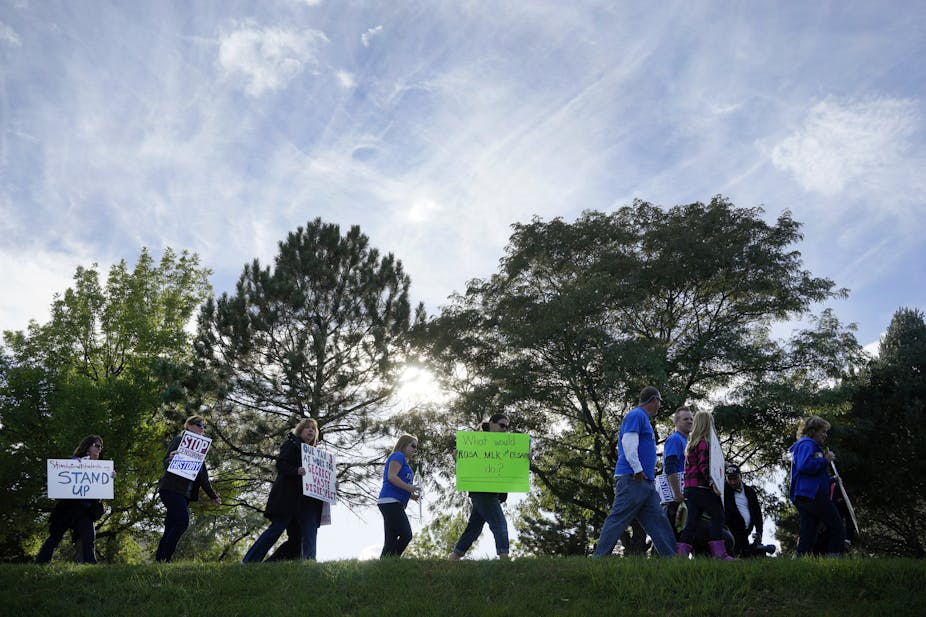Students in Jefferson County, Colorado, popularly known as JeffCo, have learned an important civics lesson about their power to influence policy. In late September, hundreds of students organized to oppose the JeffCo school board’s attempt to restructure the district’s history curriculum. As a result, on October 3 the school board decided to back down, although students are still dissatisfied with its conservative majority. Their efforts reflect a consistent theme in US history: that peaceful resistance has an important place in democracy.
At issue was a proposal by a conservative school board member to create a “review committee” to assess the district’s US history curriculum. In general terms, the proponent of the committee believed recent revisions to the Advanced Placement history curriculum (which occurred at the national level) did not portray the US in a good light.
But the proposed review committee had a particular task that students found problematic. Specifically, the committee would ensure that history materials promoted, among other things: “patriotism, essentials and benefits of the free enterprise system, respect for authority and respect for individual rights”. It would also prohibit the adoption of materials that condoned civil disorder, social strife and disregard of the law.
Peaceful opposition
The school board engendered precisely the reaction they wanted to prevent: civil disobedience. In reaction to the proposal, hundreds of students left their high schools, taking to the streets to protest the review committee. Broadly speaking, students contended that the proposal was part of a larger plan to “whitewash” history. The result would be a glossy portrayal of the nation that would conveniently overlook defining struggles for equality.
It is worth noting that political activism was the most effective route for the students to challenge the proposal. Had students sued, they would have lost. The school board did not act on any proposal, so parents and students did not suffer any injury that courts could have remedied. In other words, the students were wise to exercise their free speech rights in the court of public opinion, rather than a federal courthouse.
Symbol of a larger struggle
This issue should not be seen in isolation. Rather, it reflects continuing struggles in education policy that are being played out across the nation. JeffCo is a microcosm of these debates. Indeed, in the course of the last few months, controversy has developed around almost all areas of contested policy at the national level. These include the use of test scores in evaluating teachers, the role of unions in education, different forms of teacher compensation, and control over curriculum.
But the protests in JeffCo reflect something else: the collision of outside interests with local grassroots political activism. The recent election of several conservative members to the board has been linked to a larger efforts by a national interest group, Americans for Prosperity, with close ties to the influential Koch Brothers.
The billionaire industrialists Charles and David Koch have devoted considerable resources to promoting their conservative agenda at the national level. More recently, they have focused on local elections and policy formation. For the moment, the power of outside influences may have met their match in the form of students who actually attend the schools where the policies would take effect.
Youth democratic spirit
In Tinker v Des Moines, the seminal 1960s case concerning student First Amendment rights, the US Supreme Court cautioned that our children are not “closed-circuit recipients” of “official” knowledge.
In that case, the Supreme Court was asked if school officials violated the First Amendment by disciplining students for wearing black armbands to school. In finding that in fact they did, the Court recognized that the vitality of democracy depends on the ability of our youngest citizens to think independently and transfer their rights into political action. When young people disagree with the government, they should know how to translate that sentiment into action. That’s exactly what happened in JeffCo.
At the risk of being too optimistic, these events offer encouraging signs. To begin with, young students empowered themselves. They used their constitutionally guaranteed right to speak. To be sure, the school board did not completely scuttle the plans for a committee, but they have reconstituted the proposal to include a broader base of people reviewing the curriculum.
At the moment, this has not appeased the teenage students, some of whom cannot vote. The students are currently discussing whether they will attempt a recall election of the conservative school board members. A recent rally attracted the attention of the state’s lieutenant governor, Joe Garcia.
These events may also reflect the limits of outside, non-local interest groups based in Washington DC on local issues. As local policy may be more transparent and subject to focused public attention, especially when compared to what transpires in Washington DC, the influence of outside organizations may be reduced. That could be one explanation, at least so far, of why the school board proposal was thwarted or, at the least, came to public light.
No matter how this story ends, JeffCo students have learned the most valuable lesson of their public schooling: they can influence their government. With all due respect to the teaching profession, no class experience could have simulated this lesson.

